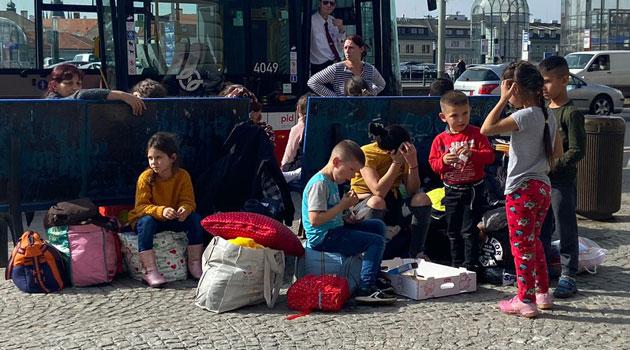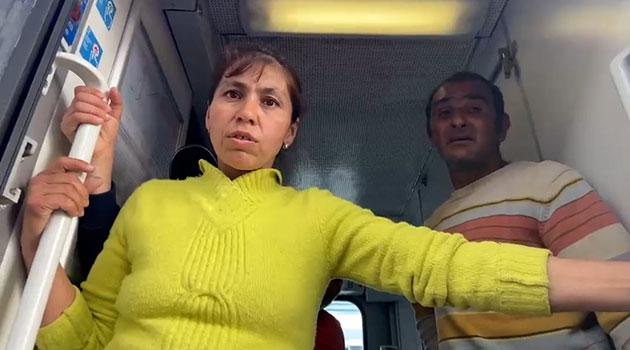In Czech Republic, the Hungarian passports held by some Romani refugees from Ukraine have not proved to be an advantage

Refugees from Ukraine who are dual Hungarian-Ukrainian citizens are being discussed more and more in the Czech Republic by politicians who mainly speak of them in the context of the Romani people fleeing Russia’s aggression against Ukraine. The Governor of South Moravia, Jan Grolich (Christian Democrats – KDU-ČSL) was the first to speak up – without any familiarity with the context or knowledge of the issue – to accuse “Hungarian Ukrainians” of attempting to abuse welfare in the Czech Republic.
The next Czech politician to level accusations was the Governor of the Moravian-Silesian Region, Ivo Vondrák (ANO), who added ungrounded allegations that such refugees had been committing theft. Mayor of Prague Zdeněk Hřib is also justifying taking a different approach toward Romani refugees from Ukraine who hold Hungarian citizenship.
Hungarian passports as a source of conflict
Since the beginning of the year 2011, Hungary has been making it possible for anybody who could document direct descent from Hungarian ancestors and at least a basic knowledge of the Hungarian language to acquire citizenship. As of the year 2017, Hungary had awarded one million such passports.
Such citizenship was acquired mostly by inhabitants of the countries bordering Hungary, i.e., Romania, Serbia, Slovakia and Ukraine. Hungarian Prime Minister Viktor Orbán awarded these passports for a very simple reason.
Adding voters to the electoral rolls in Hungary proper has been the motivation for this policy. However, the move sparked tensions between Hungary and its neighbors.
Slovakia, for example, responded by making it the norm that if its citizens are recognized as citizens of any other country, they lose their Slovak citizenship. Conflict over the passports also arose between Hungary and Ukraine.
In October 2018 the Hungarian consul was expelled from Ukraine for awarding Hungarian passports to Ukrainian nationals. They were being distributed above all to residents of Berehove (Beregszász), which Hungarians from the Transcarpathian Region consider to be their center.
Roughly 150 000 Hungarians live in that region. Their leaders complain of cultural and linguistic discrimination on the part of the Ukrainian authorities, and naturally Orbán has been adding fuel to that fire.
Romani people with dual citizenship
It is unclear how many Hungarian passports have been awarded in Ukraine, but the numbers are apparently in the tens of thousands. Romani Ukrainians are among those who have been awarded Hungarian passports.
“It’s quite difficult to say the exact number of Romani people in Ukraine who hold Hungarian passports, or more correctly it can be said that they are dual citizens. Ukraine officially says that overall there are as many as 130 000 such citizens in Ukraine,” Julian Kondur, a Romani activist from Ukraine, told news server Romea.cz.
Kondur says that unlike Slovakia, in practice Ukraine has not enforced sanctions for holding dual citizenship, although legislatively that should be the case. “The constitution establishes that if a citizen of Ukraine acquires the citizenship of a different state, that person must forego Ukrainian citizenship. However, it doesn’t much work that way in practice. Bills have been developed in Parliament that should better regulate this,” Kondur said.
The advantages of acquiring a Hungarian passport are clear to Kondur: “Access to the EU labor market and, simply put, more opportunities to acquire financial support from Hungary. On the other hand, people do not reflect at all on what kind of leverage that gives the Government of Hungary to influence Ukraine’s domestic affairs,” he explained.
Hungarian citizens fleeing Russia’s war on Ukraine are citizens of an EU country, so temporary protection should not be necessary
When Governor Grolich of the South Moravian Region speaks of Hungarians “exploiting” the migration crisis in order to access welfare here in the Czech Republic, he is absolutely misguided to do so – such refugees are fleeing Ukraine and, like anybody else, they have been affected by the aggression of Russia to a greater or lesser extent. The moment these refugees enter either Hungary or Slovakia, and travel from there to the Czech Republic, they enter the European Union holding an EU passport and, according to Czech Government officials, that means they cannot be eligible for aid in the same way that Ukrainians just with Ukrainian passports are.
“The Temporary Protection Directive does not apply to citizens of EU Member States,” Hana Malá, a spokesperson for the Czech Interior Ministry, told news server Romea.cz. “Such a person is able to make use of the advantages associated with being a citizen of an EU country.”
Magda Faltová, director of the Association for Integration and Migration NGO, agrees to a certain extent. “Unfortunately, that’s how it is, they do have dual citizenship and from the perspective of Czech legal regulations, they do not have to be covered by temporary protection because they are citizens of an EU country,” Faltová told news server Romea.cz.
“You have to understand that temporary protection is about addressing residency first and foremost, upon which, naturally, all other support depends, but that is primarily because persons under temporary protection cannot access standard benefits. I believe that from a legal perspective the state is proceeding correctly, but it is naturally still necessary to address the social dimension of this entire situation – which is to say that these people are still homeless, fleeing a war zone, and the state should arrange emergency housing and financial aid for them from the Exceptional Immediate Aid program and address their situation in a standard way,” Faltová told Romea.cz.
Although their Hungarian citizenship is, for example, the biggest alibi voiced by Mayor Zdeněk Hřib as to why, according to him, Romani people from Ukraine are not able to receive the same aid as ethnic Ukrainians, the Czech Interior Ministry does not know how many such refugees there are in the Czech Republic. “The Interior Ministry is encountering this, but statistics on it are not kept,” Malá told news server Romea.cz.
What kind of aid are dual Hungarian-Ukrainian citizens entitled to in the Czech Republic?
According to Faltová, in the Czech Republic, EU citizens are meant to have an opportunity, under certain circumstances, to apply for the welfare benefits that are called “aid to those in material distress”. “With regard to state social support, that entitlement arises only after applying for a temporary stay, so they need to explain the purpose of the stay and they need a certificate of accommodation, a procedure which is of course very complex, and they need proof of health insurance, which again is often problematic. The only benefits that it is realistic for them to access after arriving here are Exceptional Immediate Aid, the living allowance, and a housing supplement, but only after they have been registered as residents here for three months,” she said, adding that EU law presumes that if citizens of one EU Member State cannot afford residency in another EU Member State, they should return to the country of which they are a citizen, in this case, Hungary.
